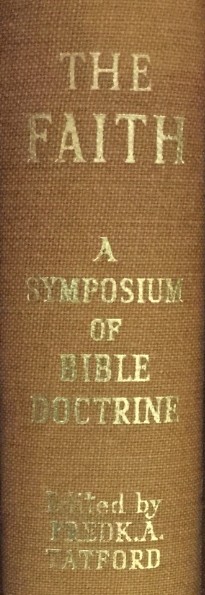 There’s a 5-page essay on “The Fatherhood of God” in the 1952 book The Faith: A Symposium of Bible Doctrine. The book, though it never clearly says so, is a collection of essays by Plymouth Brethren writers, and includes among its 25 chapters nice work by F.F. Bruce and W.E. Vine.
There’s a 5-page essay on “The Fatherhood of God” in the 1952 book The Faith: A Symposium of Bible Doctrine. The book, though it never clearly says so, is a collection of essays by Plymouth Brethren writers, and includes among its 25 chapters nice work by F.F. Bruce and W.E. Vine.
The essay on the fatherhood of God is by Arthur Rendle Short (1880-1953), a professor of surgery who did quite a bit of theological writing.
Short’s main point is that the doctrine of God’s fatherhood is difficult to state correctly, but that the key is balance. There are two extremes to avoid, and he sets them up in his first paragraph:
Many years ago, I heard the preacher at a chapel in a Cornish seaside resort declare that the universal Fatherhood of God and the universal brotherhood of man is the outstanding theme of the New Testament. Dr. Torrey, in his very valuable book What the Bible Teaches, says (p. 299), ‘The doctrine of the universal Fatherhood of God is utterly unscriptural and untrue.’ Obviously these opinions cannot both be true. They both over-simplify a real problem.
What is the real problem that these two authors over-simplify? Short draws together a set of scriptures which suggest that God is the Father of all:
-Luke’s genealogy traces sonship all the way back through Adam to God.
-The parable of the Prodigal Son pictures sinners as having left their father’s house, and salvation as returning to it.
-In Matthew 23:9, speaking to the multitude, Jesus says “One is your Father, which is in heaven.”
-Jesus poke to the Samaritan woman about worshiping ‘the Father.’
-Paul in Athens quoted the pagan poet, ‘we are his offspring.’
-Eph 3:14-15 describes the Father as the one from whom all every family (or fatherhood) is named.
Short knows that none of these passages is decisive, and even together they don’t come close to justifying that preacher’s claim to have identified “the outstanding theme of the New Testament.” And over against them are some strong lines of biblical reasoning:
-“Admission to the privilege of sonship is by the new birth, or by adoption.”
-We are children of God by faith in Christ (Gal 3:26).
-Those who receive Christ become sons of God (John 1:12-13).
-The redeemed receive adoption as sons, elevated above servant status (Gal 4:5-7).
-I John 3:10 describes the marks of those born of God, and those who are children of the devil.
-When the Pharisees question Jesus’ origin, he tells them they are of their father the devil (John 8:39-44).
Short concludes, “If we are to base our doctrine on all these Scriptures and not on an arbitrary selection of them, it would appear that we must recongise that, whilst the Bible teaches the Fatherhood of God, it is not always with exactly the same meaning.” Here is how he goes on to characterize two of the meanings: “There is a scriptural sense in which God is described as the Father of the human race; they are His offspring and their first ancestor was His son. But, on the other hand, all men are not His sons in the more personal sense.”
And the final paragraph of the essay strikes this balance:
The preaching of the Gospel suffers if the doctrine of the Fatherhood of God is not rightly understood. If all men without distinction are thought of as being personally sons of God, the necessity for the new birth disappears, and a kind of universalism takes its place. But if the prodigal son can no longer be sure that God has the feelings of a father for him, the Gospel we preach will seem very hard and legal. Let us take care, therefore, to recognise the perfect balance of Scripture in this matter.
The biblical way of talking, it seems to me, falls very much in favor of Torrey’s statement that “the doctrine of the universal Fatherhood of God is utterly unscriptural and untrue,” but we could add Short’s clarification: “Universal Fatherhood of God” is unscriptural if it means that God is personally the Father of every human by virtue of their existence, rather than merely indicating that God is the source and origin of the being of every creature and therefore in that sense their father.
And perhaps the deepest insight Short gives in this brief chapter is that the message of salvation by adoption comes to sinners whose deepest grief is that they have left the Father’s house and need to return from their wanderings to their true home.
Related at Scriptorium: J.H. Sammis’ fine little hymn about the summons of God the Father; George MacDonald’s misguided attack on the doctrine of adoption (for similar motives).